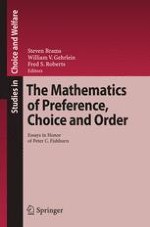
2009 | OriginalPaper | Chapter
Altruistic Utility Functions for Joint Decisions
Authors : David E. Bell, Ralph L. Keeney
Published in: The Mathematics of Preference, Choice and Order
Publisher: Springer Berlin Heidelberg
Activate our intelligent search to find suitable subject content or patents.
Select sections of text to find matching patents with Artificial Intelligence. powered by
Select sections of text to find additional relevant content using AI-assisted search. powered by
All of us make decisions that are not entirely self-centered; we voluntarily anticipate what we think to be the preferences of others and incorporate them into our decision making. We do this, not because of legal requirements or social norms, but because we are altruistic; we care intrinsically about the welfare of others. In this paper, we illustrate for these types of decisions how confusion may arise because the distinction between our personal (egotistical) preferences and our altruistic concerns is not carefully distinguished. We first define the distinction between personal and altruistic preferences, and then show how to use both of these kinds of preferences in prescriptive decision making methodologies.
We confine ourselves to the class of problems where two or more people must select a common course of action. The following story illustrates a simple example. Joan and Dan have decided to have dinner and must choose a restaurant. They quickly specify three possibilities: a Brazilian restaurant, a French restaurant, and a Thai restaurant. Joan is thoughtful and wishes to choose a restaurant that Dan will really like. Similarly, Dan wants to choose a restaurant that pleases Joan. So what happens? Joan, thinking about what might be Dan's preferences, decides that Dan would like the French restaurant, followed by the Brazilian restaurant, followed by the Thai restaurant. Dan, thinking about what Joan would like, also decides that the French restaurant would be best, followed by the Brazilian restaurant, and then the Thai restaurant. Joan speaks first and suggests the French restaurant. Dan, thinking that this is what Joan wants, agrees and off they go. During dinner discussion, Joan mentions that she would have preferred the Thai restaurant to the French restaurant. Somewhat surprised, Dan then says that he also would have preferred the Thai restaurant. They wonder how this state of affairs came about.